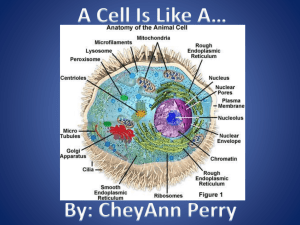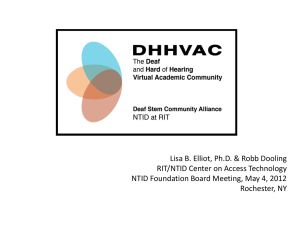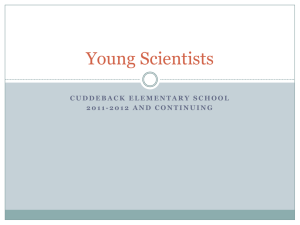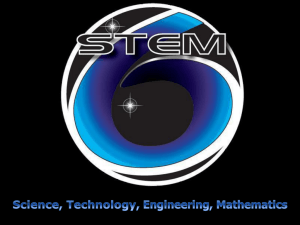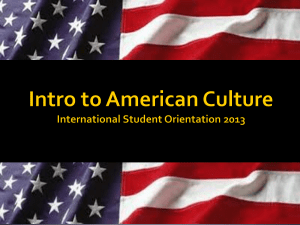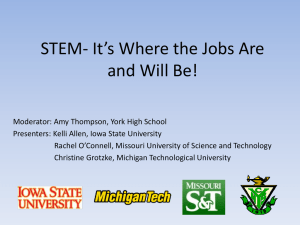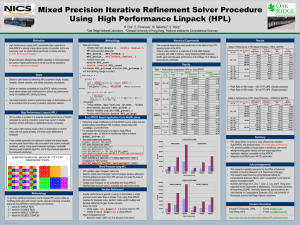Seminar - Center for Excellence in Science Education
advertisement
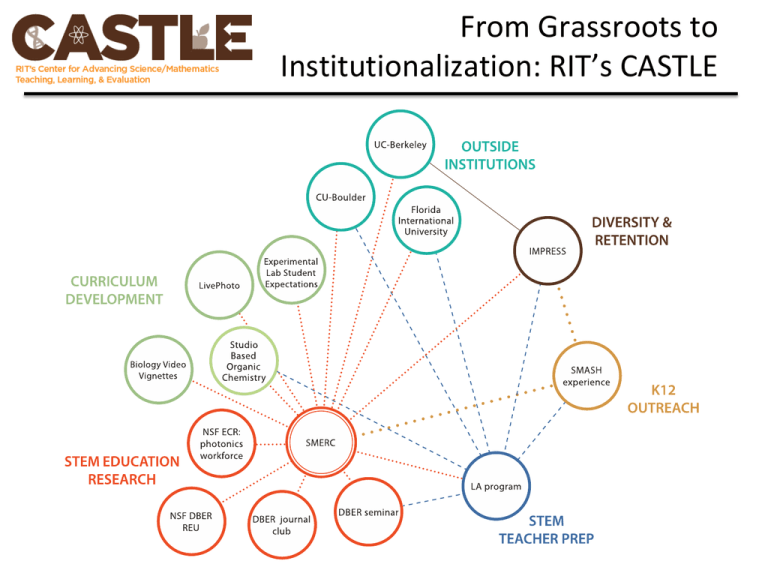
From Grassroots to Institutionalization: RIT’s CASTLE Themes in CASTLE development • Organic/emergent • Partnership between administration and faculty • Broad: spans departments, disciplines, activity types • Focused: strategic growth Institutional Context • RIT: comprehensive institution, strong emphasis on undergraduate education • College of Science: 170+ faculty in departments of chemistry, biology, physics and math • Institute transitioning from teaching only to requiring prominence in scholarship for tenure & promotion Meet Dina Newman, 2010 • Hired as research scientist, now tenuretrack in Biology (Human Genetics) • Strong interest in teaching & undergraduate education • New Institute T&P policies emphasized scholarship, colleagues at UR & NTID abruptly left • Very competitive research area + lack of institutional resources + de-emphasis of teaching Faculty + Administration = ? • Faculty: unhappy with current situation, motivated to change • Administration: saw change — education research — as aligning w/Institute policy Dean encouraged Dina to contact physics education research faculty about changing scholarship focus. Outside-in Change Reinholz et al., Towards a Model of Systemic Change in University STEM Education. (2014) Timeline April 2010 Dean meets w/Bio faculty, suggests DBER focus 2010 June 2011 Faculty win NSF Noyce award to fund LA program 2011 2012 June 2010 Sep 2011 5 Faculty First SMERC BER propose, Dean paper published funds, SMERC, Apr 2013 VPR advances $100K to CASTLE 2013 Oct 2012 Dean suggests STEM Educ. Center Apr 2014 Faculty win two NSF IUSE, one ECR and a DBER REU award ($1.3M total) 2014 Sep 2013 Faculty win NSF STEP grant ($900K). Physics dept. hires PER faculty. SMERC Proposal Science & Math Education Research Collaborative (SMERC) Faculty Actions 1. Created journal club 2. Initiated DBER research projects 3. Traveled to DBER conferences Administrative actions 1. Endorsed DBER for tenure and promotion 2. Financial resources for travel, external seminar speaker & equipment 3. Space (lab, meetings,…) Framing • Concerted effort to establish appropriate language to describe group activities: discipline-based education research as Scholarship of Discovery (not pedagogy) • Rigor: Internal study ranked peer-reviewed journals in DBER by impact factor • External speakers meet w/Dean, School Heads, Provost to discuss DBER national trend, alignment w/SMERC A new type of Champion Middle-out • champion implements and advocates for change • convinces departmental peers • established mechanisms for communication & decision-making (faculty meetings, committees) Outside-in • champion responsible for maintaining regular communication between faculty & administration • no established mechanisms COS strategic plan: SMERC an “Emerging Area” STEM Education Center: SMERC will evolve into an Institute-wide center, promoting innovation in STEM education through discipline-based education research, student-centered curricular reform, rigorous assessment, and focused professional development. SMERC will facilitate change in STEM education by: • Conducting rigorous discipline-based education research, involving undergraduate and graduate students, to study issues involving postsecondary student performance within a scientific discipline. Timeline April 2010 June 2011 Dean meets w/Bio Faculty win NSF faculty, suggests Noyce award to DBER focus fund LA program 2010 2011 2012 Sep 2011 June 2010 Faculty propose, First SMERC BER Dean funds, SMERC paper published Apr 2014 Faculty win two NSF Apr 2013 VPR advances IUSE, one ECR and a $100K to CASTLE DBER REU award ($1.3M total) 2013 2014 Sep 2013 Oct 2012 Faculty win NSF STEP Dean suggests grant ($900K). STEM Educ. Center Physics dept. hires PER faculty. College Education Initiatives • SMERC • Women in Science Summer Math “SMASH” Experience for 8th grade girls • Learning Assistant program to recruit secondary education teachers, drive course transformation • Faculty-led curriculum development projects • IMPRESS: improve retention of deaf/hard-of-hearing & 1st-gen STEM majors Center for Advancing Science/Math Teaching, Learning & Evaluation (CASTLE) Faculty Actions 1. reached out to colleagues, identified potential collaborations 2. Created bylaws, defined mission, broad vision: “dedicated to rigorous scholarship in STEM Teaching, Learning & Evaluation” Administrative actions 1. Encouraged (pushed?) faculty to create Center 2. Vice-President of Research advanced $100K on expected F&A (later forgiven) Interface of Institutional Priorities • Strategic priorities: student success, innovation, diversity and faculty scholarship • CASTLE emphasizes synergy between these priorities • LAs help faculty transform classes, improve retention, lead to new scholarship • IMPRESS improves retention, spawns new research in student metacognition Sustainability & Synergies Sustainability & Synergies studentcentered classes Course Transform Learning Assistants (LAs) LAs mediate student discourse to facilitate learning in as small groups LAs at RIT • 2012: NSF Noyce Capacity Building grant • 2012-2013: weekly faculty meetings to brainstorm about LA usage • 2013-2014 • Fall: 15 LAs, 8 faculty mentors • Spring: 32 LAs, 15 faculty mentors • 2014-2015: Institute funding for 51 LAs, targeting high DWF-rate courses Key LA experiences Practice: LAs lead weekly learning sessions of 6 to 20 students; promote argumentation, discourse Content: Weekly planning sessions with faculty member who is teaching the course (2 to 10 LAs per faculty member) Pedagogy: LAs take a weekly course in science education theory and practice LA usage: Physics Facilitate student discourse in Workshop-style intro classes LA usage: Math Facilitate student discourse in small groups in Flipped Classroom LA usage: Chemistry Process Oriented Guided Inquiry Learning (POGIL) Exercises LA usage: Genetics C.R.E.A.T.E. Fraction of Classes Preliminary Results 25% Traditional 20% LA-supported 15% 10% 5% 0% 5% 15% 25% 35% 45% Course DWF rate • Eliminated “super-high” failure-rates 55% 65% Individual Successes 50% Course Avg. Faculty + LA DWF Rate 40% Faculty Alone 30% 20% 10% 0% Math 111 Math 211 Math 161 Biol 101 Integrating Metacognitive Practices & Research to Ensure Student Success STEM Talent Expansion Program Metacognition: awareness of one’s own knowledge • How one learns • Identity, culture, affect • Self-assessment: how well one has learned • Coherence of what is learned (from 1 domain to another, e.g. math/physics to engineering) • Lateral (concurrent) • Longitudinal (past to present to future) Overview • Improve retention Deaf/HoH & 1st Gen STEM majors through explicit metacognitive activities • 2 week summer experience • 1st year courses • 2nd year Learning Assistant program • Colleges of Science, Engineering, Computer Science and Applied Science & Technology • 105 applicants for summer experience (20 accepted), Fall courses IMPRESS Activities Morning: Investigating climate change Afternoon: Reflection, journaling, metacognitive activities Innovations/Emphases • The Science of Climate Change • Journal writing • Quiet reflection • New group metacognition activities - Create a sign for metacognition - Stereotypes - What makes an expert? - Mindset - Self-assessment, unskilled/unaware - Personal struggles (turning point in community) Community Student Feedback • “Students LOVE IMPRESS. The extent to which they felt they benefited from their participation was striking. ” • “Striking was the mention of developing empathy and understanding for others, listening skills and overcoming discomfort interacting with students who are different.” • “Hearing students were very excited by the presence of deaf students and saw their inclusion as a strength.” • “Deaf students appreciated the mix and did not want a program where they were separate.” Scholarship • 3 publications in preparation w/collaborators from Kansas State and DePaul universities • Development of RIT’s IMPRESS • Negotiation between DHH and hearing students in a communal learning environment • Expert-to-novice transition in metacognitive-rich classrooms • ACCESS Network: RIT, Berkeley, Colorado, Maryland, Arizona State, Chicago State (Franklin & Ptak, NSF $356K) Fall Metacognition Course • STEM advisors placed targeted students (48) • Tue/Thurs, 75 minutes, co-taught with Elizabeth Hane (biology faculty) • “Ethical perspectives” foundational course, satisfies Institute general education requirement • Designed to guide students to think metacognitively about concurrent (introductory) STEM courses Metacognitive Topics • Mindset • Bloom’s Taxonomy • Self-assessment • How People Learn: Experts and Novices • How People Learn: Transfer • Stereotype Threat • Student-centered learning • Diversity and Inclusivity in STEM Course Readings Class Topic Readings 2 Mindset Mindset (Dweck) Ch 1, 2 3 Bloom’s Taxonomy 4 Unskilled and Unaware Biology in Bloom (Crowe, 08), Questions about Questions (Allen 02) Unskilled & Unaware (Kruger & Dunning, 99) 5 10 Self-efficacy & Concept maps Mindset How Chronic Self-Views Influence (and Mislead) SelfAssessments (Critcher & Dunning, 2009) Mindset (Dweck) Ch 3, 8 11 How People Learn - Intro Learning: From Speculation to Science. HPL, Ch. 1 12 HPL: Experts vs. Novices How Experts Differ from Novices. HPL, Ch. 2 13 HPL: Transfer Learning and Transfer. HPL, Ch. 3 (Bransford, 2002) 14 Stereotype Threat 22 Learning Style Preferences Stereotype and Gender Thin Ice: Stereotype Threat and Black College Students (Steele, 1999), Reducing the Gender Achievement Gap in College Science: Values Affirmation (Miyake, 2012) Matching Teaching Style to Learning Style may not help Students (Glenn 2009) Of Geeks and Girls, Grossman 2009 23 Class environment • Discussion-based • Small-groups w/worksheets • Class-wide, guided by faculty • Free-ranging, very loosely guided by syllabus Lateral Transfer Map Qualitative Evaluation Broad faculty participation • LA program driving faculty affiliation • Faculty network interested in student-centered pedagogies • attracts “traditional” STEM faculty, raises Center profile Federal Funding • AY 2014: $2.4M in NSF Awards $1.5M $1.25M $1M $750K $500K $250K $0K 2011 SMERC created 2012 2013 2014 CASTLE CASTLE proposed created 2015+ CASTLE org chart Lessons learned • Alignment of Institute & faculty goals enabled collaboration outside the department • Faculty passion combined with timely administrative support — policy, financial & space — led to CASTLE • Establishing bi-directional communication allowed common language to develop, new role for Champion • multi-disciplinary approach led to broad faculty network http://www.rit.edu/cos/castle http://www.rit.edu/cos/smerc SMERC 2015 • Collaborative network across Institute • Strong tenure case • HAPPY!


